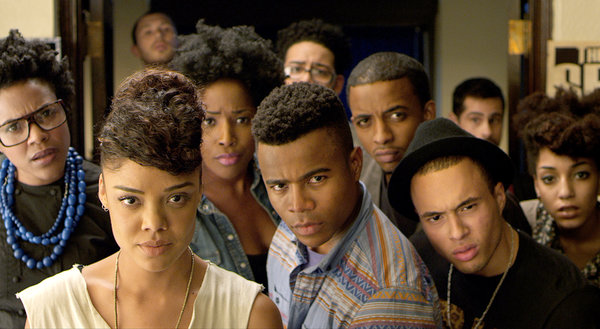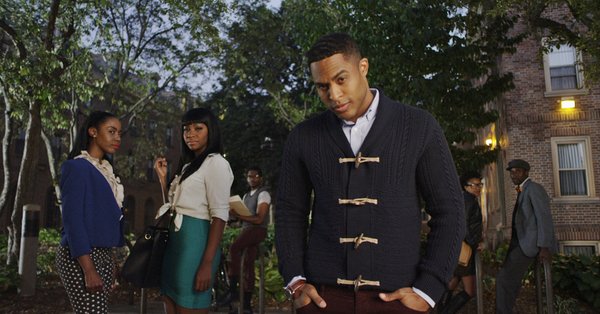
Movie Review: ‘Dear White People’
The Times critic A. O. Scott reviews “Dear White People.”
Video by Robin Lindsay on Publish Date October 17, 2014. Photo by Ashley Nguyen/Roadside Attractions, via Associated Press.“Dear White People” is the name of Justin Simien’s first feature film, and I’ll say right away that it is as smart and fearless a debut as I have seen from an American filmmaker in quite some time: knowing but not snarky, self-aware but not solipsistic, open to influence and confident in its own originality. It’s a clever campus comedy that juggles a handful of hot potatoes — race, sex, privilege, power — with elegant agility and only an occasional fumble. You want to see this movie, and you will want to talk about it afterward, even if the conversation feels a little awkward. If it doesn’t, you’re doing it wrong. There is great enjoyment to be found here, and very little comfort.
“Dear White People” is also the title of a series of campus radio broadcasts and viral Internet videos concocted by one of the movie’s major characters, a college student named Samantha White, played with heartbreaking poise by Tessa Thompson. Sam, as she is called, uses “Dear White People” to call out the hypocrisies, blind spots and micro-aggressions that African-Americans experience in their daily encounters with well-meaning Caucasians. Such people, including many of her fellow undergraduates at the Ivier-than-Ivy League Winchester University, make up a big part of Sam’s fan base. This is less because they want to subject themselves to her scolding than because they crave reassurance that they don’t really need it. The eagerness of some whites to prove that they “get it” on matters of race — their clumsy appropriations of African-American idioms and pop-cultural forms — is one of the targets of Sam’s critique and Mr. Simien’s satire.

And so, at least for this director, is the tendency of some black people to poke at that insecurity, and to engage one another in fierce battles about authenticity, appropriate conduct and political strategy. “Dear White People” deals out a deck of race cards, most of them jokers. To change the metaphor, the film leads its characters and its viewers — pale-skinned critics very much included — down a path strewn with eggshells, some of which sit on top of land mines.
Winchester is a hothouse of inflamed sensitivity and warring identities, populated mainly by young people who are eager to do the right thing as well as all the other things that college students usually do: drink beer, hook up, make friends, incubate careers and maybe even take a class or two. Like real-life American institutions of higher learning, this make-believe college strives to resolve painful and intractable social divisions, only to end up reproducing them on a smaller scale and in a more rarefied and intensified form.
Sam, a mass of contradictions in her own right, is just one element in a sprawling and intricate narrative machine. Mr. Simien audaciously sets in motion at least a half-dozen crisscrossing plots, all of which converge at a campus party that goes terribly and all too believably wrong. Sam is running for the leadership of a dormitory whose traditional character as an all-black residence is threatened by a change in university housing policy. Her rival is Troy (Brandon Bell), a square-jawed, clean-cut Big Man on Campus who is also her ex-boyfriend. His father (Dennis Haysbert) is the dean of students, and Troy’s current (white) girlfriend, Sofia (Brittany Curran), is the daughter of the university president (Peter Syvertsen). Sofia’s brother, Kurt (Kyle Gallner), is the editor of the college humor magazine and a proudly politically incorrect provocateur (and, as such, kind of a jerk).

Sam’s current lover, a teaching assistant in her film class, is also white, which may be why she keeps their relationship secret, tolerating the amorous attention of Reggie (Marque Richardson), her ally in militancy and, perhaps in her own mind, a more appropriate romantic partner. But the heart rarely obeys the imperatives of ideology, which can be confusing enough on their own. Sam’s struggles are mirrored by those of two other African-American students seeking a way to fit in at Winchester while staying true to themselves. One is Coco (Teyonah Parris), who tries to set herself up, in web videos and in the way she dresses, talks and does her hair, as Sam’s antithesis, an advocate of assimilation and upward mobility. She also wants to impress a reality-show producer who is sniffing around campus looking for provocative material.
And then there is Lionel (Tyler James Williams, faintly recognizable to fans of “Everybody Hates Chris”), a gay nerd — though he detests such labels — with an unruly Afro and a clear allergy to the posturing and position taking that surrounds him. Recruited by the school paper to report on race relations at Winchester (and also on Sam’s campaign), he endures condescension, curiosity and contempt as his white and black peers try to slot him into a pre-existing stereotype, refusing to see him as the brainy, observant, yearning intellectual that he is.
Such misrecognition is the universal currency at Winchester and also, implicitly, beyond its walls. “Dear White People” brilliantly uses the complexities of Obama-era racial consciousness to explore a basic paradox of interpersonal interaction. We are all stereotypes in one another’s eyes and complicated, unique individuals in our own minds. Somehow, within the compass of a compact, modestly budgeted (and independently financed) feature, Mr. Simien holds the antics of an astonishing variety of recognizable human types up to critical scrutiny. At the same time, he explores the desires and frustrations of a motley collection of plausible human beings with amused compassion.

Not that anyone is let off the hook. “Dear White People” does not point the way toward a happy, huggy, post-racial future. Nor does it prophesy a revolutionary fire next time. And it does not pretend that “race” is a symmetrical problem to be solved by acts of reciprocal good will on both sides. This is in part a movie about racism, about how deeply white supremacy is still embedded in institutions that congratulate themselves on their diversity and tolerance. It is, in other words, about how the distance from a place like Winchester to a place like Ferguson, Mo., is not as great as some of us might wish or suppose.
Mr. Simien serves harsh medicine with remarkable charm and good humor. He is an incisive writer and a disciplined and decorous filmmaker, framing and cutting his scenes with clean, almost classical economy. Someone says of Sam, an aspiring filmmaker, that she secretly likes Ingmar Bergman more than Spike Lee. Mr. Lee’s “School Daze” is a clear reference point here, and while Bergman is not an obvious influence, it’s possible to catch echoes of Whit Stillman, Claude Chabrol and even Pedro Almodóvar in Mr. Simien’s feel for the nuances and perversities of social life.
Everyone should see this movie, and everyone will see it a little differently. Maybe you will think it goes too far, or not far enough. Since I happen to belong to the group to which it is explicitly addressed, a direct response seems warranted. Dear “Dear White People”: Got your message. Keep in touch.
“Dear White People” is rated R (Under 17 requires accompanying parent or adult guardian). Offense freely given and eagerly taken.